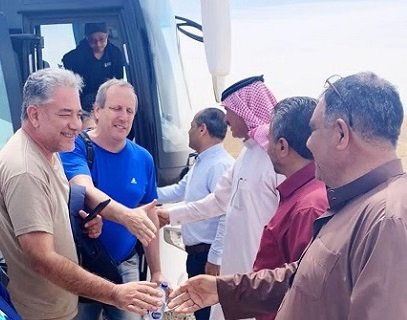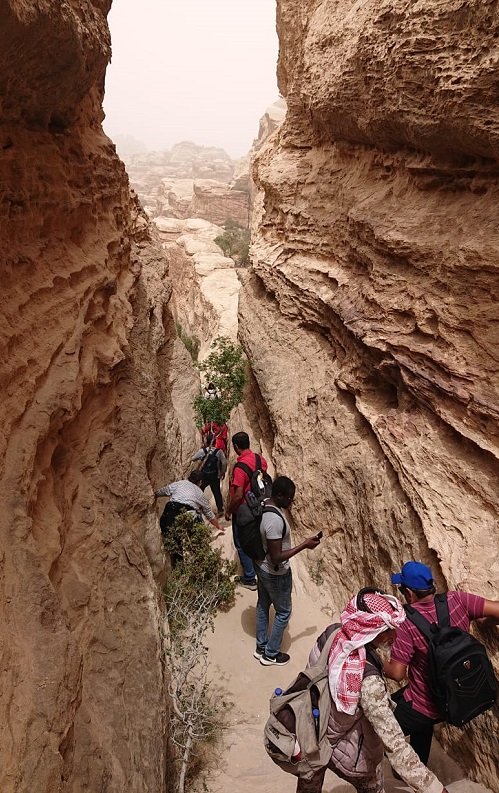The Land Matrix at the GLF 2022
The month of May marked a milestone for many of us involved in the land sector, as we were finally able to come together in person for the first time since the onslaught of the COVID-19 pandemic at one of the main events in the calendar – the Global Land Forum (GLF) 2022. Hosted by the International Land Coalition, the GLF saw more than 800 people from 81 countries gather in Swemeh, Jordan, from the 21st to the 26th, to deliberate several critical issues, from land governance and land rights to climate change and food security. Here some of the Land Matrix Initiative (LMI) members share their key highlights from this historic event.
******************************************
Markus Giger
Centre for Development and Environment (CDE), Chair of the Land Matrix Steering Committee
Although CDE has been a member of ILC for 10 years, I had never had a chance to participate at the GLF previously – so for me personally, it was a wonderful opportunity to meet so many of the ILC members and be informed first-hand about the work done by so many. It was also great to see some of our Land Matrix colleagues again and speak to them face-to-face.
Along with the many positive reactions we received on the work of the LMI, some of which was presented during sessions at the Forum, I was really pleased that several participants expressed an interest in working more closely with us. Through my interactions with fellow participants, I also feel that I now have a better perception on what other organisations and networks are doing on the ground and at different policy levels. In addition, attending the ILC Council, where CDE is represented during the current triennium, was an excellent opportunity to engage with the ILC One Team and other council members and to contribute to the strategic discussion on the ILC work.
For me, one of the highlights of the GLF was getting a glimpse of the landscapes and the culture of Jordan, as well as some first insights into the complex and conflicting land tenure context in the Middle East, a region I had never visited before. I listened to the stories from the field presented by LMI members, which have enriched me. The importance of the land tenure issue for the fight against climate change, for social justice, and for biodiversity has become even more evident to me: this is not an academic question – there are people and their livelihoods at stake. I hope the LMI can contribute to this important fight. I was also moved by the recounts of the many environmental defenders that were killed for being activists that fight to protect their land rights. This reality is tragic, and hopefully the activities of ILC can contribute towards a more peaceful future.
******************************************

Martín Simón
Fundapaz, Latin America RFP Coordinator, member of the Land Matrix Steering Committee
I went to the GLF on behalf of Fundapaz, which is the Land Matrix Regional Focal Point in Latin America (Land Matrix LAC), and has been a member of the ILC for more than 10 years. One of the things that really struck at the Forum was the presence and energy of young people, something that had not happened before. In this vein, making the work of the Land Matrix LAC visible at the GLF was very positive and brought young people closer to consulting about the initiative. In this way, one of the actions activated in Jordan was to link the Youth Committee of the ENI Argentina with Land Matrix LAC to analyse the effects of large-scale land acquisitions (LSLAs) on young farmers. In another sense, being able to make direct contact with the other members of Land Matrix, after going through the COVID pandemic, provides energy and renews work commitments.
******************************************
Myline Macabuhay
Asian Farmers Association for Sustainable Rural Development (AFA), Asia RFP Coordinator
The attendance of AFA, a member of ILC in Asia, at the GLF was vital, as the promotion of secure tenure rights of family farmers is one of our organisation's peasant agendas. The GLF provided us with an opportunity to network with other organisations working on land issues, as well as development partners, such as the EU and IFAD, with which we can engage in our people-centred initiatives. As coordinator for the land rights' agenda, I am personally interested in learning about the plights of family farmers in other regions, as well as the work other ILC members and stakeholders are doing to spotlight this issue. As AFA, we were also keen to share our own work, such as our involvement with the Land Matrix as the Asia Regional Focal Point, and our programme to attract youth to agriculture, which was nominated for the ILC Awards.
Most of the sessions I attended focused on the importance of data on land governance – data availability, accessibility, transparency, and integration into policies, programme and project implementation, and monitoring. I was particularly interested in the work of ILC members on participatory community-mapping, which empowers local communities to raise awareness on and promote their tenure rights. This is similar to the work that AFA and PAKISAMA, the host of the Land Matrix National Land Observatory in the Philippines, is doing with local advocacy maps, and complements the objectives of the Land Matrix. I also thought the presentation of the Land Matrix report on investor practices in the framework of compliance with the VGGTs in LSLAs in Africa was a crucial contribution to the GLF, as it linked data to policy monitoring and evaluation.
While it was not part of the main programme, the field visits organised at the start of the GLF was the highlight of the event for me because it allowed us to touch base with the communities that the host organisation (IUCN and SEEDS) worked with. I can see and feel their pride and joy when presenting their accomplishments, especially when they showed us their restored rangelands.
******************************************
Marie Gradeler
Global Policy Frameworks Monitoring, CIRAD
I attended the GLF as an organiser and ILC focal point during the field trips. The GLF was an excellent opportunity for me to meet more members of the ILC, and helped me learn more about them, their organisations, their goals, and their issues and needs relating to data, tools, and training, for example. Meeting and exchanging with them helps me to better understand how initiatives like the Land Matrix can help them overcome the challenges they face.

I also got the chance to speak to a lot of land defenders from around the world during the Forum. Meeting people from the organisations we are trying to support helped in understanding their needs and the problems they face. It is one thing reading about it, but gathering first-hand experience has a far greater impact. Better understanding these people helps in aiding the design of the tools we develop. One of the activities that really raised my awareness was the field trip to Dana, in which all participants had a debate about the natural reserves that are created to protect the landscape and wildlife. This field trip was a highlight for me on a personal level too, as it was the first time I got to meet other members of the ILC and learn about their cultures, their personal stories, and how they interact with other organisations and stakeholders. The land defenders talked about their organisation's accomplishments, but also about the struggles and problems they faced. Connecting with them in a more informal setting allowed me to really understand the people and experience their emotions, which I would not have been able to do through just listening to formal presentations.
However, I also found the presentations enormously valuable, especially the data-oriented ones from initiatives like the Land Matrix, Land Mark, LandEx, and Prindex. These allowed people to share their own data-related experiences and discuss how they could gather data, and then use the indicators and statistics of the end product to help locals defend their lands. They also presented a platform to explore the ways in which we could connect the results from these different initiatives into a single monitoring tool that would make the task of exploring the data and writing of reports easier. This is especially pertinent in light of the issue that even if the data becomes accessible and is well documented, it is sometimes difficult to make it seen as valid to other organisations or the government. More than a quality/quantity ratio, it is a credibility concern that has been raised frequently, and something I personally didn't take enough into account while working on these projects. Finally, the presentation of and discussions about the compliance of the VGGTs in Africa was an excellent opportunity to hear from the different issues our partners may encounter and at which levels, and rethink the targets of the Land Matrix initiative end results.
Photo credit: Sergio Couto Gonzales
******************************************
Angela Harding
Land Matrix Basket Fund Coordinator
The LMI has a long-standing relationship with the ILC and its network: ILC is a partner of our initiative, several of our LMI partners are members of ILC, and we regularly collaborate with ILC members in different regions in terms of data campaigns, training, and other support services. The GLF provided an avenue to reconnect (and connect) with these partners, and indeed meet new partners in the global land community.
The LMI also had a stand in the Ideas Fair session and two presentations in the breakout sessions: one in which we presented findings from our third analytical report, Taking stock of the global land rush: Few development benefits, many human and environmental risks, and another in which we discussed the outcomes of our assessment of the implementation of the VGGTs in the context of LSLAs in Africa, which we report on in a new publication, Little progress in practice: Assessing transparency, inclusiveness and sustainability in large-scale land acquisitions in Africa.
In addition, the GLF was an extremely valuable networking opportunity for me in my role as the coordinator for the Land Matrix Regional Focal Point in Africa. For example, I was able to connect with several stakeholders in Malawi and Ethiopia, which was useful in terms of the data campaigns we are currently running in these countries, discuss potential data exchange and collaboration with connections from the Democratic Republic of Congo (DRC), and link up with new contacts who are launching a Land Observatory in West Africa, called the West African Land Observatory of Economic Community of West African States.
Along with these exciting developments, one of the key highlights from the GLF for me was the nomination of our partner AFA for the ILC Good Practice awards for its work regarding youth leadership for secured land rights and strong family farming systems. It was also great to see how GLF cast the spotlight on the importance of data within the land sector and the references made in several panels to the LMI and our data. This reinforces that we are achieving our goals as an open data ecosystem that supports evidence-based and inclusive decision-making in the outcomes that affect the lives of land-users and builds an open development community of citizens, researchers, policy-makers, and technology specialists.
******************************************
For more information about the GLF 2022, visit https://www.globallandforum.org/